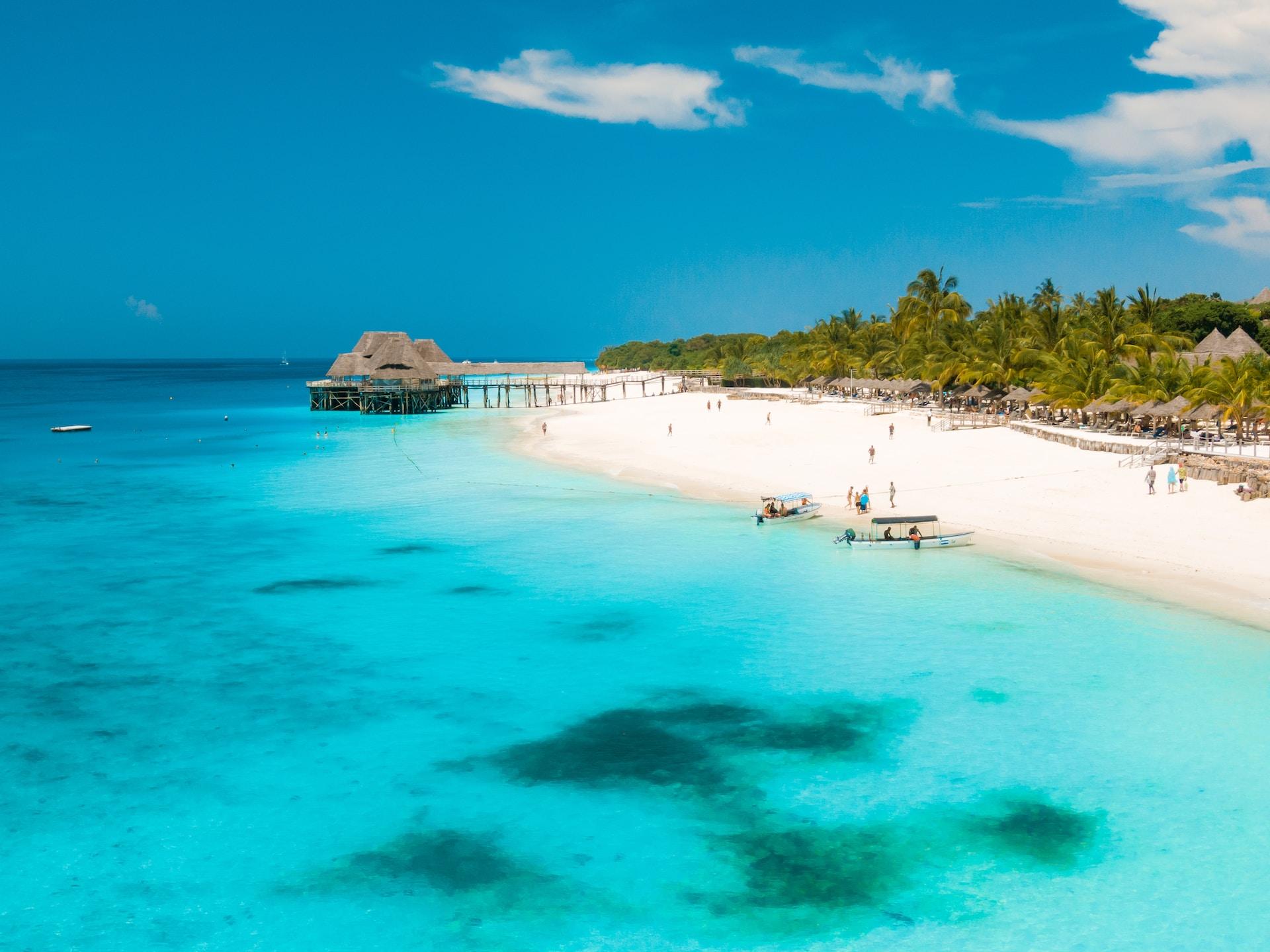Zanzibar got us. Turquoise-blue water, white sand, tall palm trees, the smell of freshly cooked fish. In short, one of the last natural paradises, which promised many extraordinary experiences. The winter was extremely long this year, to tell the truth, much longer than was bearable for us. That's why in February we escaped for a week-long fabulous trip to Israel. But it was not enough. So we continuously monitored the low airfare offerings. Sometimes we just daydreamed about locations far out of our budget, but now it was different. Zanzibar got us.
With a backpack across the island
After 12 hours we land on the black continent. Zanzibar (Zanj barr = island of the blacks) belongs to Tanzania and is separated from mainland Africa by only 70 km. The peaceful life of fishermen and farmers here was first disrupted by Arab sailors who introduced Islam, and later by the Portuguese, for whom it became one of the main slave reservoirs.
Instead of taking an overpriced taxi, we walk to the capital. Two white men with large backpacks may attract attention, but after the first surprised glances, we feel at ease. No one is in a hurry and no one is walking. Why? With temperatures hitting the forties, it's not exactly an ideal activity. We too disappear down the beaten path into the bush at the first opportunity, and plunge into the waters of the Indian Ocean.
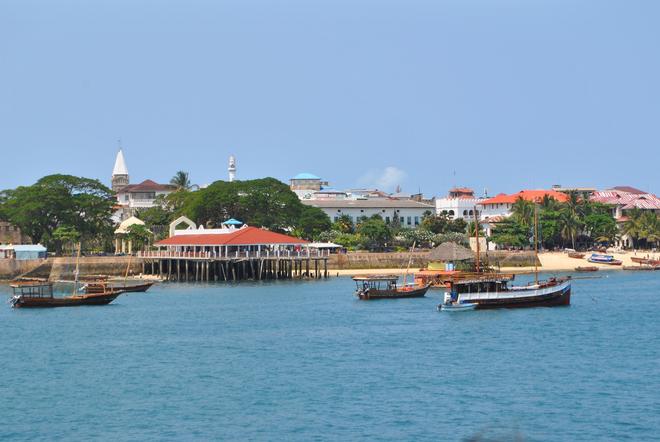
In the old part of Zanzibar city, Stone town (all the houses are made of coral rock, hence the name), we have booked accommodation. We leave our heavy rucksacks in our room and venture into the labyrinth of narrow streets, which fill with barbecues and stalls as the sun sets. We wash down bites of grilled octopus and barracuda with chilled sugar cane juice and let ourselves be swept away by a moment that will never be repeated.
Darajami marketplace
There are plenty of opportunities to blow money in Africa, but this style goes beyond us. Even now, we get up before sunrise and head to the biggest local market – Darajami. For breakfast. This vibrant place offers everything from fish, to fruit and vegetables, to pharmaceuticals and electronics. We pay a ridiculous two euros for an avocado almost as big as a handball, a mango the same size, a couple of red bananas and six coconut flour chapatis. What a paradox, compared to the prices in the restaurants.
We drive to Jambiani in a cargo version of a daladala minibus, complete with a few bags of potatoes, a fold-out bed, a bicycle on the roof and 30 people jostling for position on the wooden front porches. When I ask the driver, who is also the one charging passengers, how long we'll be going, he just shrugs – "I don't know, it's awfully far". We understand about 50 km. For the locals, everything is far away. Later when we mention where we've been, they just shake their heads incomprehensibly and don’t understand.
East coast of the island
Jambiani is a small and probably the coziest town we visited in Zanzibar. The children shouted jambo (hello) at us with a smile, the braver ones came closer. However, the entire east coast is characterised by a strong low tide, so you can only swim here in the morning and evening.
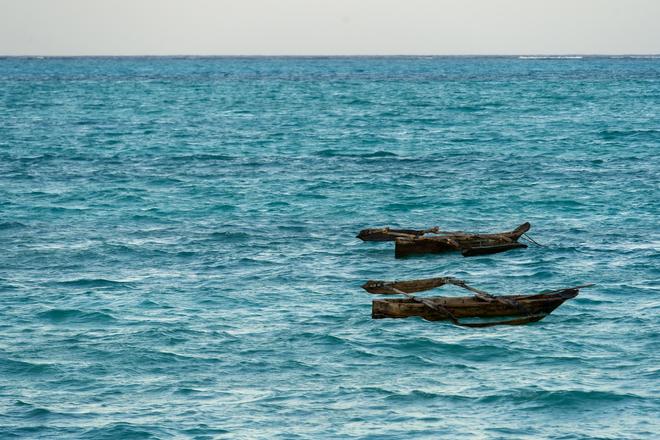
No worries, with the high tide the fishermen appeared and started to prepare their catamarans for fishing. I peek around them and when one speaks to me in English, we make a deal and we set sail for an evening snorkel on a nearby coral reef.
The amount he asked for was rather symbolic, given the joy he offered us by sailing on a wooden sailboat as the sun set. It was perfect. Shortly after six in the morning we sit on the beach again, waiting for the birth of a new day. The rising sun, the clear blue water, the catamarans with their sails stretched in the morning breeze with a sparkling path behind them. It was unbelievably romantic!
Night on the beach
We continue hitchhiking to Paje and then to the town of Pingwe. At traditional low tide, we lay out a blanket in the shade under a rock and jump into about half a meter of water. It's enough for snorkelling and the advantage is that the small brightly coloured fish don't have much room to escape. For the night, we move along the shoreline to the opposite side of the narrow headland to Michamwi.
At sunset the water is even warmer, we don't look for accommodation, we want to stay right on the beach to sleep – like George, the barman from one of the beach bars. He sleeps non-stop on a sun lounger and offers us the same comfort. When he puts on Bob Marley, we know we've come across the right guy.
A night trying to avoid mosquitoes wasn't exactly the best idea, mosquitoes are incredibly annoying before the rainy season, but the sound of the ocean lapping and breakfast put us in a good mood.
The most beautiful beach in Zanzibar
The beaches in Nungwi are said to be the most beautiful on the island, and it's true. The hoteliers regularly remove the algae from the beach, which elsewhere mars the crystal white sand. And the tourists love it, which is why there are plenty of them here even at the end of the season. More than on all the other beaches combined. Luxury hotels contrast sharply with the modest conditions in which the locals live, so we just took a swim, bought fresh chapatis in the stylish "Mama Africa" restaurant and returned to Stone Town.
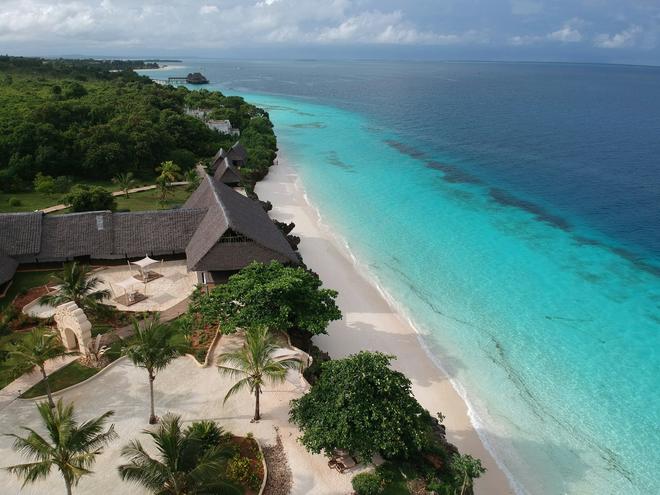
The Darajami marketplace is alive even at night, the alleys filled with other vendors, we try the juice of young coconut and several types of fruit unknown to us. Everything tastes fuller, more wholesome than in Europe. We survey the offerings, undulating to the rhythm of the vibrant square, not even realising that we are the only white people here. Tourists just don't come here at night, it's supposedly dangerous.
Everything comes to an end
On the last day it was cloudy, so we filled the time with walks around the city. Most of the houses were built in the 19th century, when the city was one of the most important trading centres of the Indian Ocean.
Our flight isn't until the morning, so we walk to the airport again. We shop at the home-made stalls – mangoes, grilled fish, baked potatoes and coconut fritters – as a matter of course. We wash it all down with sugar cane juice and walk through the dark streets with full bellies. "You do realise that everyone might not be happy to see you here?" a local detective snaps us out of our carefree haze. We're only a few hundred yards from the airport, but we hang our heads for good measure and pick up our pace.
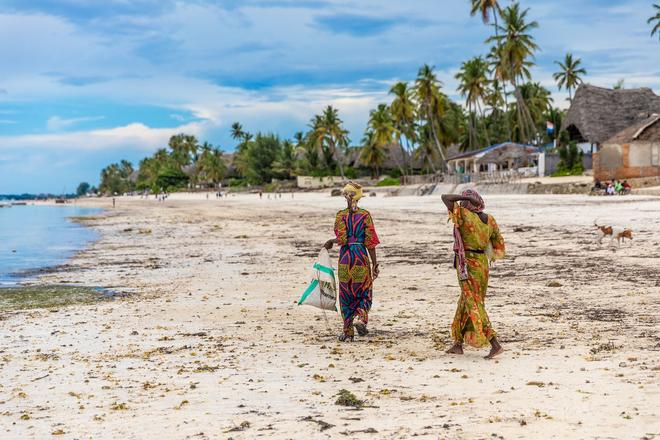
It was our first trip to "black Africa" and we couldn't have asked for a better introduction than Zanzibar. A beautiful, colourful and fragrant island with friendly people, an island of love we will remember for a long time to come. We experienced moments there when words were not important, time did not exist and all we felt was an intense sense of life...
